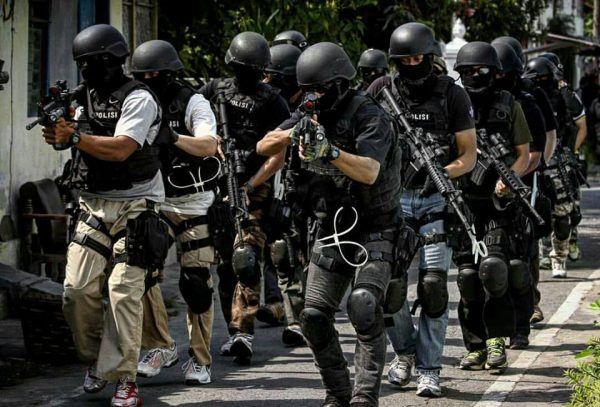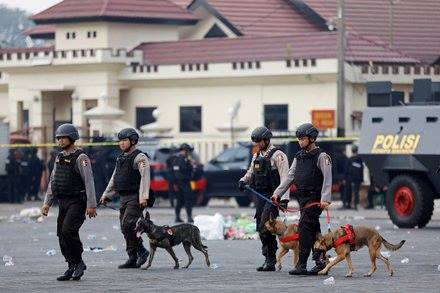On 13 May 2018, coordinated suicide bombers attacked three churches across the provincial capital of Surabaya, a city in the north-eastern tip of Java Island. The explosions all went off around 07:00 local time, indicating great precision on the part of the attackers. Dozens were wounded in the attack, many critically. In the final assessment, 13 were reported killed and over 40 injured. Investigations by Indonesia’s police and counter-terror personnel reached some pretty concrete conclusions already on the day of the bombing. The findings were disturbing to say the least.
According to senior police reports, the attackers are believed to have been a family affiliated with Jamaah Anshar Daulah (JAD), an extremist group linked to the the Islamic State. Police chief General Tito Karnavian layed out the facts of what transpired as they are currently known:
The father of the family was the bomber at the Surabaya Pentecostal Church (GPPS) on Jl. Raya Arjuna on the west side of the city. His two teenage sons carried out another suicide bombing that involved driving a motorcycle into the Saint Mary Immaculate (SMTB) Catholic Church of Surabaya in the Gubeng neighborhood. The mother of the family along with her two young girls, aged 9 and 12, carried out the mission at the Diponegoro Indonesian Christian Church (GKI). The three reportedly arrived at GKI by being dropped off by the father before he made his way to his target at GPPS. Shortly after arriving at GKI, the mother reportedly blew herself up in the company of her children.
ISIS was quick to claim responsibility for the attacks. “Three martyrdom attacks result in at least 11 Christians and church security guards being killed and 41 being injured in the city of Surabaya located in the region of East Java in Indonesia,” was the group’s official statement delivered via its Amaq News Agency. A longer statement was subsequently published that went into more detail. “After putting their trust in Allah, several Khilafah soldiers set out towards three Crusader temples located in Surabaya city in East Java region in eastern Indonesia.” The self-declared caliphate described the victims as “Crusaders.”
The following day, a family of five rode two motorcycles to the front gate of Surabaya’s police headquarters before detonating explosives, injuring 10 people. Police reports also attributed this incident to ISIS supporters.
These attacks came shortly after another violent episode connected to ISIS. Last week, inmates at the Mako Brimob detention facility, a maximum security prison in Jakarta, staged a massive riot and succeeded in wresting control of three whole cell blocks for 36 hours. More than 150 prisoners were involved in the incident, in which inmates seized dozens of guns. Five security officers were taken hostage and brutally executed before the prisoners finally surrendered. Video footage of the riot—although yet to be authenticated—was released by ISIS-linked social media accounts and circulated by the Amaq media outlet. The images showed men balaclavas brandishing weapons and standing with black and white ISIS flags.
Indonesian police denied ISIS was behind the recent violence at Mako Brimob, claiming the riot was sparked by a dispute over food. But brushing off any ISIS connection should be met with skepticism, especially in light of the growing trend ISIS has had in spreading in the country, particularly through Indonesia’s notoriously overcrowded prisons. Last November, detainees at Mako Brimob staged a similar riot, during which participants also took photographs of themselves next to an ISIS flag. All the signs are pointing to expanding inroads by the Islamic State into Indonesia, a relatively progressive, modernized country marred by a history of extremism. The situation in Indonesia today is a case worth examining: A country that unwittingly became a hotbed of militancy, rose to the challenge of addressing it, and is being forced to remain instep with the diversifying tactics terror groups use to execute attacks and appeal to potential recruits.
Indonesian Militancy 101
Indonesia has its share of experience dealing with domestic militant groups over the decades. However, this has consisted mostly of battling separatist groups such as East Timorese militia fighting for independence. The country got its first taste of Islamist extremism in the 1940s when the Darul Islam, headed by their influential leader Sekarmadji Maridjan Kartosoewirjo, entered the scene. The group expanded greatly in the 1950s during the “Liberal Democracy” era during which Indonesia suffered from tremendous instability due to sectarianism and the ineptitude of its government in managing the economy. During this time, Dural Islam maintained 15,000 gorilla fighters and gained control of one-third of West Java, almost all of South Sulawesi, as well as most of Aceh province on Sumatra Island. Eventually, central authorities were able to regain control of the these territories and the group disbanded in 1962. But even at its height, Dural Islam functioned more like a rebel political faction than an al-Qaeda-style terror group.
The pivotal event for the country’s approach to countering terror came in 2002 with the infamous Bali bombings. On the night of 12 October, in the tourist district of Kuta on the island of Bali, three suicide bombers targeted various tourist sites in the city. The bombings were planned for one of the busiest tourist periods of the year in Kuta and near its most tourist populated areas by Kuta Beach. The explosions themselves were immensely damaging. The Mitsubishi van that detonated outside the Sari club reportedly left a crater one meter deep. In all, 202 people were killed in the attacks and another 200 injured.
Bali was a wake up call for Indonesia and sent the country on a course for taking heed on the extremist problem that had infiltrated the country. The attacks led directly to the formation of Indonesia’s counter-terror agency Detachment 88. A focus on integrating cutting-edge technology and the most developed in intelligence tradecraft, Detachment 88 has had tremendous success over the years, especially in cracking down on the organization responsible for the Bali attacks, the al-Qaeda-linked Jemaah Islamiah.

Largely due to the work of the Detachment, Indonesian authorities began making great progress in their counter- terror activities. Security forces tracked down and arrested hundreds of jihadists and shrunk the operational capacity of Jemaah Islamiah down to a fraction of its original strength. Many of the group’s leaders were captured or killed. Eventually, the international community began to recognize Indonesia’s progress. In 2008, the US State Department rescinded its travel warning on Indonesia. Australia, Indonesia’s biggest source of tourism, soon followed suit. Another milestone came in 2015 when the International Cooperation Review Group (ICRG), an international body that assesses illicit financial activities, decided to take Indonesia out of the Financial Action Task Force list of “Non-Cooperative Countries or Territories” (NCCTs). This meant that Indonesia was no longer labeled by the international body as a country uncooperative in the global fight against money laundering and terrorist financing.
While sporadic attacks continued throughout the years, Indonesia seemed on a good trajectory in its war on terror. The emergence of ISIS onto the global scene, and their unique approach to terror recruitment, introduced a whole new challenge into the country’s war on terror.
The Pacific’s Fertile Ground for Jihadism
Indonesia first experienced ISIS in 2016 when a group of members carried out multiple attacks on a shopping center in Jakarta. Although the assault included both shooters and a suicide bomber, attackers managed to kill only two people. However, the incident signaled a new stage of militancy in the country after years of progress in eliminating extremist cells. Thanks to security efforts, ISIS was able to pull off only one bombing in Indonesia in 2017—against a bus terminal in East Jakarta. But the real challenge ISIS now presents in Indonesia, and the unique threat that it has always posed to the world since its inception, has been its success in recruitment and collecting supporters.
ISIS is very good at self promoting. Their ability to leverage communications in multiple channels, from social media to printed content, has proved highly effective in filling its ranks and spreading its ideology. Even Abu Bakar Bashir, the leader of Indonesia’s “old school” jihadist group Jemaah Islamiah, pledged allegiance to the then newly-founded group in 2014.

The most innovative example of the Islamic State’s recruitment tactics has been its activities in the country’s prisons. Capitalizing on the high volume of young Muslim criminals found in correctional facilities, recruiters are able to attract large numbers of excited followers eager to be part of the prestigious Islamic State. Understanding the dynamic of these recruiting activities is important to understanding why it’s so successful. When officials deny terror connections and insist on more material motivations for violence—like in the Mako Brimob incident last November—the distinction is a bit of a red herring. These “economic” triggers may be the catalyst for any given incident, but are only tapping into much deeper extremist and militant sympathies.
The way perpetrators of the recent attacks in Surabaya were brought into the ISIS fold is as yet unknown. Regardless, the spate of attacks over the recent period should certainly be a wake-up call to Indonesian authorities and the world. The most populous Muslim country in the world is being targeted by a pretty successful ISIS propaganda campaign.
















